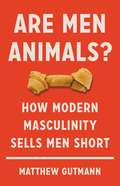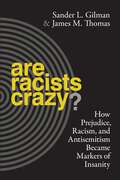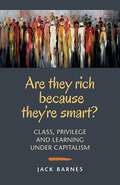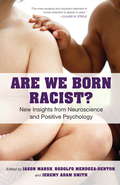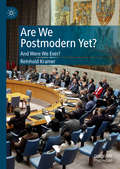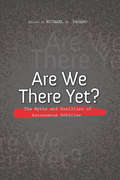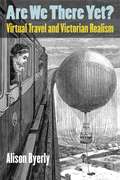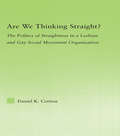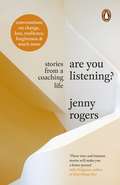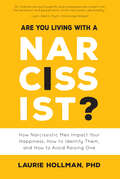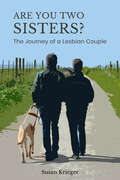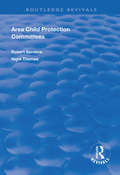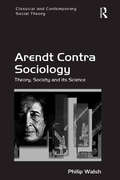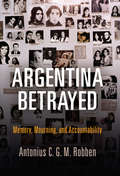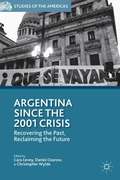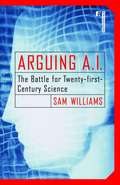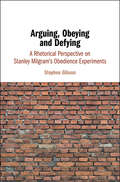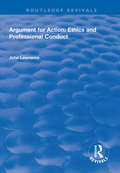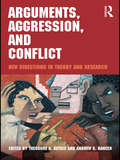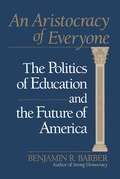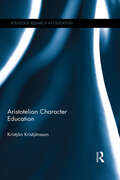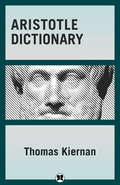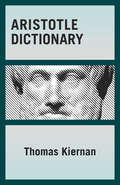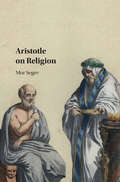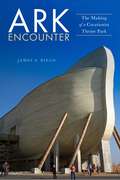- Table View
- List View
Are Men Animals?: How Modern Masculinity Sells Men Short
by Matthew Gutmann"Boys will be boys," the saying goes -- but what does that actually mean? A leading anthropologist investigatesWhy do men behave the way they do? Is it their male brains? Surging testosterone? From vulgar locker-room talk to mansplaining to sexual harassment, society is too quick to explain male behavior in terms of biology. In Are Men Animals?, anthropologist Matthew Gutmann argues that predatory male behavior is in no way inevitable. Men behave the way they do because culture permits it, not because biology demands it. To prove this, he embarks on a global investigation of masculinity. Exploring everything from the gender-bending politics of American college campuses to the marriage markets of Shanghai and the women-only subway cars of Mexico City, Gutmann shows just how complicated masculinity can be. The result isn't just a new way to think about manhood. It's a guide to a better life, for all of us.
Are Racists Crazy?: How Prejudice, Racism, and Antisemitism Became Markers of Insanity (Biopolitics #11)
by Sander L. Gilman James ThomasThe connection and science behind race, racism, and mental illnessIn 2012, an interdisciplinary team of scientists at the University of Oxford reported that - based on their clinical experiment - the beta-blocker drug, Propranolol, could reduce implicit racial bias among its users. Shortly after the experiment, an article in Time Magazine cited the study, posing the question: Is racism becoming a mental illness? In Are Racists Crazy? Sander Gilman and James Thomas trace the idea of race and racism as psychopathological categories., from mid-19th century Europe, to contemporary America, up to the aforementioned clinical experiment at the University of Oxford, and ask a slightly different question than that posed by Time: How did racism become a mental illness? Using historical, archival, and content analysis, the authors provide a rich account of how the 19th century ‘Sciences of Man’ - including anthropology, medicine, and biology - used race as a means of defining psychopathology and how assertions about race and madness became embedded within disciplines that deal with mental health and illness. An illuminating and riveting history of the discourse on racism, antisemitism, and psychopathology, Are Racists Crazy? connects past and present claims about race and racism, showing the dangerous implications of this specious line of thought for today.
Are They Rich Because They’re Smart?: Class, Privilege And Learning Under Capitalism
by Jack BarnesThe 2020 print edition was used as the source for text and page numbers. Description: (Use back cover text from print edition) Are They Rich Because They’re Smart? explains the sharpening class inequalities in the United States and the resulting conflicts accelerated by today’s slow-burning world depression. It takes apart the self-serving rationalizations of a growing layer of well-paid professionals that their schooling and ‘brightness’ equip them to ‘regulate’ the lives of working people, who can’t be trusted to know what’s in our own interests. In the coming battles forced upon us by the capitalist rulers, says Jack Barnes, workers will begin to transform ourselves and our attitudes toward life, work, and each other. Only then will we discover our own worth and learn what we’re capable of becoming.
Are We Born Racist?
by Jeremy A. Smith Jason Marsh Rodolfo Mendoza-DentonWhere do our prejudices come from? Why are some people more biased than others? Is it possible for individuals, and society as a whole, to truly defeat prejudice? In these pages, leading scientists, psychologists, educators, activists, and many others offer answers, drawing from new scientific discoveries that shed light on why and how our brains form prejudices, how racism hurts our health, steps we can take to mitigate prejudiced instincts, and what a post-prejudice society might actually look like. Bringing a diverse range of disciplines into conversation for the first time, Are We Born Racist? offers a straightforward overview of the new science of prejudice, and showcases the abundant practical, research-based steps that can be taken in all areas of our lives to overcome prejudice.
Are We Postmodern Yet?: And Were We Ever?
by Reinhold KramerIn this book, Reinhold Kramer explores a variety of important social changes, including the resistance to objective measures of truth, the rise of “How-I-Feel” ethics, the ascendancy of individualism, the immersion in cyber-simulations, the push toward globalization and multilateralism, and the decline of political and religious faiths. He argues that the displacement, since the 1990s, of grand narratives by ego-based narratives and small narratives has proven inadequate, and that selective adherence, pluralist adaptation, and humanism are more worthy replacements. Relying on evolutionary psychology as much as on Charles Taylor, Kramer argues that no single answer is possible to the book title’s question, but that the term “postmodernity” – referring to the era, not to postmodernism – still usefully describes major currents within the contemporary world.
Are We There Yet?: The Myths and Realities of Autonomous Vehicles (The Urban Agenda)
by Chris Hendrickson Austin Brown Stan Caldwell Kazuya Kawamura Taylor Long P. S. SrirajAutonomous vehicle (AV) technology represents a possible paradigm shift in our way of life. But complex challenges and obstacles impose a reality at odds with the utopian visions propounded by AV enthusiasts in the private and public sectors. The new volume in the Urban Agenda series examines the technological questions still surrounding autonomous vehicles and the uncertain societal and legislative impact of widespread AV adoption. Assessing both short- and long-term concerns, the authors probe how autonomous vehicles might change transportation but also land use, energy consumption, mass transit, commuter habits, traffic safety, job markets, the freight industry, and supply chains. At the same time, the essays discuss opportunities for industry, researchers, and policymakers to make the autonomous future safer, more efficient, and more mobile. Contributors: Austin Brown, Stan Caldwell, Chris Hendrickson, Kazuya Kawamura, Taylor Long, and P. S. Srira.
Are We There Yet?: Virtual Travel and Victorian Realism
by Alison ByerlyAre We There Yet? Virtual Travel and Victorian Realism connects the Victorian fascination with "virtual travel" with the rise of realism in nineteenth-century fiction and twenty-first-century experiments in virtual reality. Even as the expansion of river and railway networks in the nineteenth century made travel easier than ever before, staying at home and fantasizing about travel turned into a favorite pastime. New ways of representing place—360-degree panoramas, foldout river maps, exhaustive railway guides—offered themselves as substitutes for actual travel. Thinking of these representations as a form of "virtual travel" reveals a surprising continuity between the Victorian fascination with imaginative dislocation and twenty-first -century efforts to use digital technology to expand the physical boundaries of the self.
Are We Thinking Straight?: The Politics of Straightness in a Lesbian and Gay Social Movement Organization (New Approaches in Sociology)
by Daniel K. CorteseThis book highlights the strategic deployment of a straight identity by an LGBT organization. Cortese explores the ways in which activists strategically use a "straight" identity as a social movement tool in order to successfully achieve the movement objectives.
Are You Listening?: Stories from a Coaching Life
by Jenny Rogers'Absorbing' - The Guardian'Are You Listening? is a real gem: full of insights about the human psyche, non-fiction, as gripping as a novel' - Miranda Levy, author of THE INSOMNIA DIARIES on TwitterIt is very rare as an adult to find a place where you are not judged, where you can be open, honest and vulnerable: that is exactly what coaching provides. Through twenty stories from her 32 years in the coaching room, Jenny demonstrates how even the most successful people can be held back by doubts, limitations and human dilemmas, such as: · 'Can I be my real self at work?'· 'What's my purpose in life?'· 'How do I deal with unhappiness and disappointment?'· 'Should I go for a job where I get paid a fortune but know I'd be miserable?'Through these moving, beautifully written stories, Jenny reflects on the meaning of modern relationships, demonstrating how the courage to be vulnerable can make a huge, transformative difference to the quality of all our lives. 'Jenny Roger cherishes the core of truth in each of us' - Sally Helgesen, author of HOW WOMEN RISE
Are You Living with a Narcissist?: How Narcissistic Men Impact Your Happiness, How to Identify Them, and How to Avoid Raising One
by Laurie HollmanWhat’s the difference between narcissism and normal love? In the current political and social climate, narcissistic tendencies are coming under more scrutiny, but there are so many nuances to navigate, and many women don't know how to identify or respond to narcissists when they meet them, especially if they happen to be in their own home. In Are You Living with a Narcissist?, psychoanalyst Laurie Hollman, PhD, helps you identify the narcissists in your life and recognize the effect they have on your family and happiness—and what to do about it. This groundbreaking, thoroughly researched guide explores:the symptoms of Narcissistic Personality Disorder;the spectrum of healthy to pathological narcissism;how to raise a child so that he does not become a narcissist;how spouses of narcissists can live happy, healthy lives;the relationship between male narcissism and violence;the impact of culture on narcissism;and more!
Are You Two Sisters?: The Journey Of A Lesbian Couple
by Susan KriegerAuthored by one of the most respected figures in the field of personal ethnographic narrative, this book serves as both a memoir and a sociological study, telling the story of one lesbian couple’s lifelong journey together. <P><P> Are You Two Sisters? is Susan Krieger’s candid, revealing, and engrossing account about the intimacies of a lesbian couple. Krieger explores how she and her partner confront both the inner challenges of their relationship and the invisibility of lesbian identity in the larger world. <P><P> Using a lively novelistic and autoethnographic approach that toggles back and forth in time, Krieger reflects on the evolution of her forty-year relationship. She describes building a life together, from sharing pets and travels to getting married. Are You Two Sisters? addresses not only questions of gender and sexuality, but also of disability, as Krieger explores how the couple adapts to her increasing blindness. <P><P> Krieger’s title comes from a question asked by a stranger outside a remote desert bar as she and her partner traveled in the Southwest. Her apprehension about answering that question suggests how, even after the legalization of gay marriage, lesbianism often remains hidden—an observation that makes Krieger’s poignant narrative all the more moving.
Area Child Protection Committees (Routledge Revivals)
by Nigel Thomas Robert SandersFirst published in 1997. Area Child Protection Committees are at the heart of interagency child protection services in Britain. Drawing on original research, this book provides the first detailed analysis of ACPs and how they operate. The authors examine the policy role of the committees, the processes of representation, and the effectiveness of the committees’ work both in directing practice and in responding to change. They also report on research into how ACPCs deal with cases that go wrong. The book considers the impact both of agency reorganisation and of changes in child care policy on the work of the committees, and includes an account of the development of children’s service plans. If child protection policy is to change its direction, then ACPCs will have to change too. This book aims to contribute to an understanding of how that can happen.
Arendt Contra Sociology: Theory, Society and its Science (Classical And Contemporary Social Theory Ser.)
by Philip WalshHannah Arendt is today widely regarded today as a political theorist, who sought to rescue politics from society, and political theory from the social sciences. But this view has had the effect of distracting attention from many of Arendt's most important insights concerning the constitution of society, and the significance of its 'science', sociology. Arendt Contra Sociology re-assesses the relationship between Arendt's work and the theoretical foundations of sociology, bringing her insights to bear on some key themes within contemporary theoretical sociology. Re-reading Arendt's distinctions between labour, fabrication and action as a theory of the fundamental ontology of human societies, this book assesses her criticism of the tendency of many sociological paradigms to conflate the activity of fabrication with that of action. It re-examines Arendt's understanding of central areas of research within contemporary theoretical sociology - including the meaning of power, the trajectory of modern science, the rise of consumerism and the problem of reflexivity. This volume offers a comprehensive reconstruction of Arendt's thought, uncovering its refutation of, or latent contribution to, key sociological approaches. It will be of interest to sociologists, social and political theorists and philosophers of social science.
Argentina Betrayed: Memory, Mourning, and Accountability (Pennsylvania Studies in Human Rights)
by Antonius C. Robben<p>The ruthless military dictatorship that ruled Argentina between 1976 and 1983 betrayed the country's people, presiding over massive disappearances of its citizenry and, in the process, destroying the state's trustworthiness as the guardian of safety and well-being. Desperate relatives risked their lives to find the disappeared, and one group of mothers defied the repressive regime with weekly protests at the Plaza de Mayo in Buenos Aires. How do societies cope with human losses and sociocultural traumas in the aftermath of such instances of political violence and state terror? <p>In <i>Argentina Betrayed</i>, Antonius C. G. M. Robben demonstrates that the dynamics of trust and betrayal that convulsed Argentina during the dictatorship did not end when democracy returned but rather persisted in confrontations over issues such as the truth about the disappearances, the commemoration of the past, and the guilt and accountability of perpetrators. Successive governments failed to resolve these debates because of erratic policies made under pressure from both military and human rights groups. Mutual mistrust between the state, retired officers, former insurgents, and bereaved relatives has been fueled by recurrent revelations and controversies that prevent Argentine society from conclusively coming to terms with its traumatic past. <p>With thirty years of scholarly engagement with Argentina—and drawing on his extensive, fair-minded interviews with principals at all points along the political spectrum—Robben explores how these ongoing dynamics have influenced the complicated mourning over violent deaths and disappearances. His analysis deploys key concepts from the contemporary literature of human rights, transitional justice, peace and reconciliation, and memory studies, including notions of trauma, denial, accountability, and mourning. The resulting volume is an indispensable contribution to a better understanding of the terrible crimes committed by the Argentine dictatorship in the 1970s and their aftermath.</p>
Argentina Since the 2001 Crisis
by Christopher Wylde Cara Levey Daniel OzarowThis timely and interdisciplinary volume analyzes the many impacts of and contrasting responses to the Argentine political, economic, and social crises of 2001-02. Chapters offer original theoretical models and examine the relationship between political, cultural, economic, and societal spheres.
Arguing A.I.: The Battle for Twenty-first Century Science
by Sam WilliamsFew scientific topics since the theory of biological evolution have inspired as much controversy as artificial intelligence has. Even now, fifty years after the term first made its appearance in academic journals, many philosophers and more than a few prominent scientists and software programmers dismiss the pursuit of thinking machines as the modern-day equivalent of medieval alchemists' hunt for the philosopher's stone--a pursuit based more on faith than on skeptical inquiry. In Arguing A.I., journalist Sam Williams charts both the history of artificial intelligence from its scientific and philosophical roots and the history of the A.I. debate. He examines how and why the tenor of the debate has changed over the last half-decade in particular, as scientists are struggling to take into account the latest breakthroughs in computer science, information technology, and human biology. For every voice predicting machines like 2001's HAL within the next twenty to thirty years, others have emerged with more pessimistic forecasts. From artificial intelligence's pioneers John McCarthy and Marvin Minsky, to futurist authors Ray Kurzweil and Hans Moravec, to software architects Bill Joy and Jaron Lanier,Arguing A. I. introduces readers to the people participating in the current debate, both proponents and critics of A.I. who are changing the way computers "think" and the way we think about computers. Ultimately, Arguing A.I. is as much a history of thought as it is a history of science. Williams notes that many of the questions plaguing modern scientists and software programmers are the same questions that have concerned scientists and philosophers since time immemorial: What are the fundamental limitations of science and scientific inquiry? What is the nature of intelligence? And, most important, what does it really mean to be human?
Arguing, Obeying and Defying: A Rhetorical Perspective on Stanley Milgram's Obedience Experiments
by Stephen GibsonStanley Milgram's obedience experiments are among the most influential and controversial scientific studies ever conducted. The experiments are commonly understood to have shown how easily people can be led into harming another person, simply as a result of following orders. Recently, however, Milgram's studies have been subjected to a sustained critique and re-evaluation. This book draws on the vast stock of audio recordings from Milgram's experiments to reveal how these experiments can be understood as occasions for argumentation and rhetoric, rather than showing how passive subjects can be led into simply doing as they are told. In doing so, it reconsiders what we understand by 'obedience' and extends how social psychologists have understood rhetoric itself.
Argument for Action: Ethics and Professional Conduct (Routledge Revivals)
by John LawrenceFirst published in 1999. This book will help professions and professionals to identify their contribution to society and to understand the argument in which they must engage if they are to justify their conduct. Because of their specialized expertise and power, the task is both difficult and pressing. The work is divided into two parts. Part 1 discusses the concepts ‘ethics’ and ‘professional conduct’, indicating their dimensions and contested nature. In each case, following examination and analysis of relevant literature, a conceptual framework or model is proposed for locating instances of, in turn, ethics and professional conduct. In part 2, the model of ethical choice is used to discuss the ethical justification of professional conduct in the various forms, locations, and stages provided by its social setting. In this way, it provides grounding arguments for relevant action by professionals and others dealing with professionals. The book concludes with a proposal for a national standing commission on the professions.
Arguments, Aggression, and Conflict: New Directions in Theory and Research
by Theodore A. AvtgisArguments, Aggression, and Conflict provides a thorough examination of argumentative and aggressive communication. Editors Theodore A. Avtgis and Andrew S. Rancer bring together a score of prolific and informed authors to discuss aspects of the conceptualization and measurement of aggressive communication. The book features an exclusive focus on two "aggressive communication" traits: argumentativeness and verbal aggressiveness, one of the most dominant areas of communication research over the last twenty five years both nationally and internationally. The chapters include cutting-edge issues in the field and present new ideas for future research. This book is a valuable resource for instructors, researchers, scholars, theorists, and graduate students in communication studies and social psychology. Covering a variety of topics, from the broad-based (e.g. new directions in aggressive communication in the organizational context) to the more specific (e.g. verbal aggression in sports), this text presents a comprehensive compilation of essays on aggressive communication and conflict.
Aristocracy of Everyone
by Benjamin BarberIn this brilliant, controversial, and profoundly original book, Benjamin R. Barber fundamentally alters the terms of the current debate over the value of opportunity in American education, politics, and culture.Barber argues that the fashionable rallying cries of cultural literacy and political correctness completely miss the point of what is wrong with our society. While we fret about "the closing of the American mind" we utterly ignore the closing of American schools. While we worry about Japanese technology, we fail to tap the more fundamental ideological resources on which our country was founded. As Barber argues, the future of America lies not in competition but in education. Education in America can and must embrace both democracy and excellence.Barber demonstrates persuasively that our national story has always comprised an intermingling of diverse, contradictory, often subversive voices. Multiculturalism has, from the very start, defined America. From his gripping portrait of America poised on the brink of unprecedented change, Barber offers a daringly original program for effecting change: for teaching democracy depends not only on the preeminence of education but on a resurgence of true community service.A ringing challenge to the complacency, cynicism, and muddled thinking of our time that will change the way you feel about being an American citizen.
Aristotelian Character Education (Routledge Research in Education)
by Kristján KristjánssonThis book provides a reconstruction of Aristotelian character education, shedding new light on what moral character really is, and how it can be highlighted, measured, nurtured and taught in current schooling. Arguing that many recent approaches to character education understand character in exclusively amoral, instrumentalist terms, Kristjánsson proposes a coherent, plausible and up-to-date concept, retaining the overall structure of Aristotelian character education.After discussing and debunking popular myths about Aristotelian character education, subsequent chapters focus on the practical ramifications and methodologies of character education. These include measuring virtue and morality, asking whether Aristotelian character education can salvage the effects of bad upbringing, and considering implications for teacher training and classroom practice. The book rejuvenates time-honoured principles of the development of virtues in young people, at a time when ‘character’ features prominently in educational agendas and parental concerns over school education systems.Offering an interdisciplinary perspective which draws from the disciplines of education, psychology, philosophy and sociology, this book will appeal to researchers, academics and students wanting a greater insight into character education.
Aristotle Dictionary
by Thomas KiernanAt long last a comprehensive tool in English for a better understanding of the most basic terms in Aristotle's philosophy. Interested readers, students and scholars of philosophy and of the general intellectual background of Western culture need no longer be handicapped by a lack of knowledge of Greek and Latin. A careful comparison of the original Greek, Medieval and Renaissance Latin translations and a reappraisal of English usage make this work a definitive source for the precise grasp of what has been the historical Aristotle as far as the documents permit one to judge. A lengthy introduction by Professor Theodore E. James presents an analysis of the major works of Aristotle.
Aristotle Dictionary
by Thomas KiernanAt long last, a comprehensive tool in English for a better understanding of the most basic terms in Aristotle&’s philosophy. Interested readers, students, and scholars of philosophy and of the general intellectual background of Western culture need no longer be handicapped by a lack of knowledge of Greek and Latin. A careful comparison of the original Greek, Medieval, and Renaissance Latin translations and a reappraisal of English usage make Aristotle Dictionary a definitive source for the precise grasp of what has been the historical Aristotle as far as the documents permit one to judge. A lengthy introduction by Professor Theodore E. James presents an analysis of the major works of Aristotle.
Aristotle on Religion
by Mor SegevAristotle is a severe critic of traditional religion, believing it to be false, yet he also holds that traditional religion and its institutions are necessary if any city, including the ideal city he describes in the Politics, is to exist and flourish. This book provides, for the first time, a coherent account of the socio-political role which Aristotle attributes to traditional religion despite his rejection of its content. Mor Segev argues that Aristotle thinks traditional religion is politically necessary because it prepares the ground for what he considers the pinnacle of human endeavor: attaining the knowledge of first philosophy, whose objects are real beings worthy of being called gods. Developing this interpretation, Segev goes on to analyze Aristotle's references to the myths of traditional Greek religion, and to assess his influence on medieval Jewish and Christian theology and philosophy of religion.
Ark Encounter: The Making of a Creationist Theme Park (Early American Places)
by James S Bielo&“A story of many fascinating encounters between fundamentalism, creationism, biblical consumerism, and religious entertainment.&” —Timothy Beal, author of The Rise and Fall of the Bible Opened to the public in July 2016, Ark Encounter is a creationist theme park in Kentucky. The park features an all-timber re-creation of Noah&’s ark, built full scale to creationist specifications drawn from the text of Genesis, as well as exhibits that imagine the Bible&’s account of life before the flood. More than merely religious spectacle, Ark Encounter offers important insights about the relationship between religion and entertainment, religious publicity and creativity, and fundamentalist Christian claims to the public sphere. James S. Bielo examines these themes, drawing on his unprecedented behind-the-scenes access to the Ark Encounter creative team during the initial design of the park. This unique anthropological perspective shows creationists outside church contexts, and reveals their extraordinary effort to materialize a controversial worldview for the general public. Taking readers from inside the park&’s planning rooms to other fundamentalist projects and diverse Christian tourist attractions, Bielo illuminates how creationist cultural producers seek to reach both their constituents and the larger culture. The &“making of&” this creationist theme park, Bielo argues, allows us to understand how fundamentalist culture is produced, and how entertainment and creative labor are used to legitimize creationism. Through intriguing and surprising observations, Ark Encounter challenges readers to engage with the power of entertainment and to seriously grapple with creationist ambitions for authority. For believers and non-believers alike, this book is an invaluable glimpse into the complicated web of religious entertainment and cultural production.
